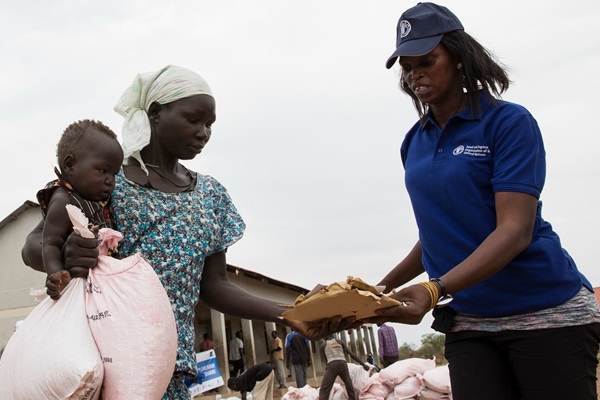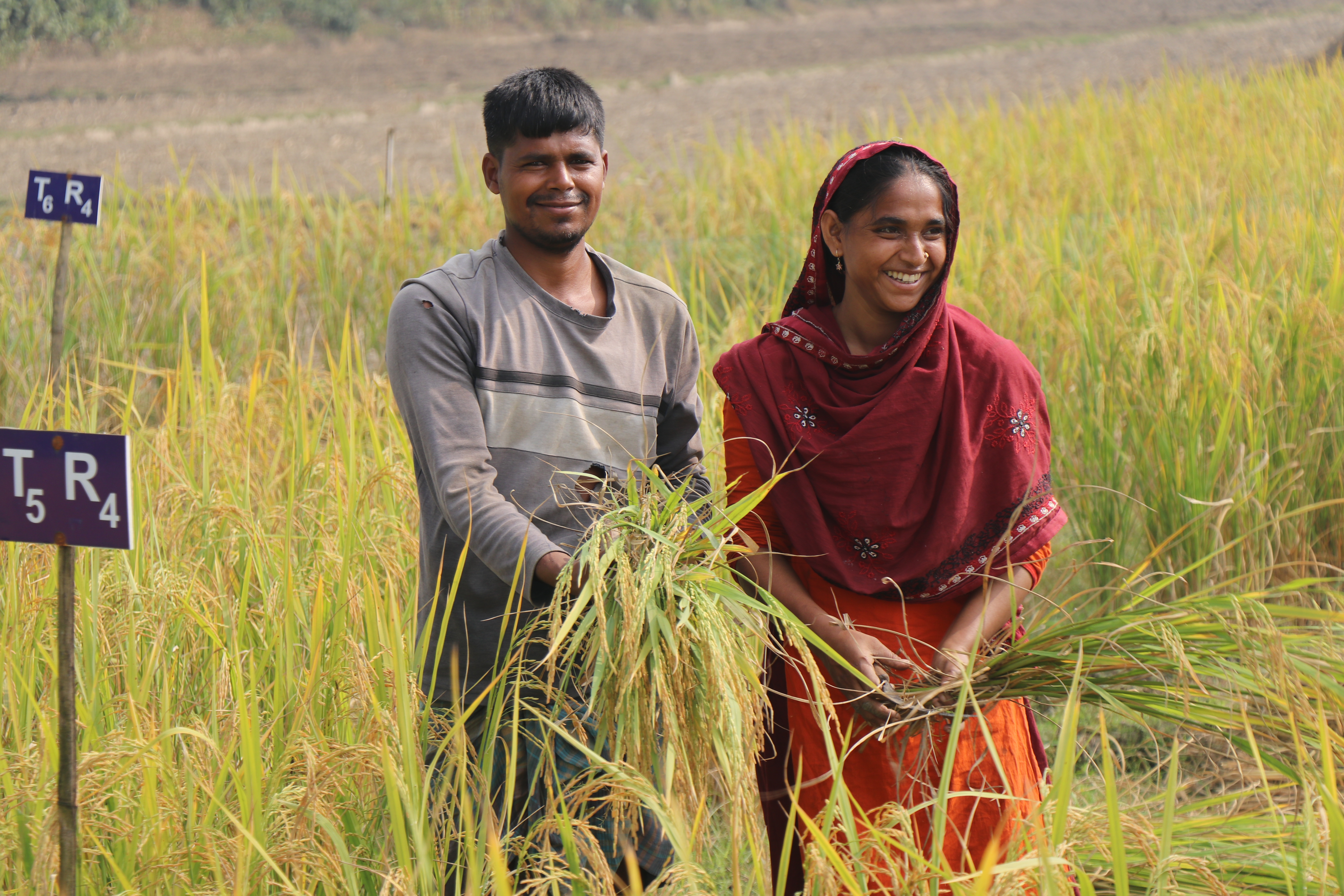Why is gender equality and rural women's empowerment central to the work of FAO?
FAO recognizes that rural women and men, together, hold the keys to end hunger, malnutrition and poverty. Rural women and girls, in particular, are recognized as agents of change and resilience builders. Across low-income countries, women make up 38 percent of agricultural employment. As agricultural producers, farm managers, processors, traders, wage workers, entrepreneurs and community leaders, they fulfil important roles across agrifood value chains, and in the management of biodiversity and natural resources, such as land and water. As illustrated in the many examples featured on this site, rural women are resilient, resourceful, industrious and innovative.
Yet the gender gap in food and agriculture is extensive. As consumers, women are more food-insecure than men in every region of the world.
And as producers, rural women face greater constraints than their male counterparts in accessing essential productive resources and services, technologies, markets, education, information and financial assets.
 The gender gap in food insecurity has grown, in 2021, 31.9 percent of women in the world were moderately or severely food insecure compared to 27.6 percent of men.
The gender gap in food insecurity has grown, in 2021, 31.9 percent of women in the world were moderately or severely food insecure compared to 27.6 percent of men.
Women continue to be under-represented in local institutions and governance mechanisms, and tend to have less decision-making power. In addition to these constraints, prevailing gender norms and discrimination often mean that women face an excessive work burden, and much of their labour remains unpaid and unrecognized.
While a focus on these constraints is crucial, it can sometimes reinforce common perceptions of rural women and girls as vulnerable victims of their circumstances, and obscure the nature and magnitude of their potential. Evidence shows that if women farmers have the same level of access as men to resources and services, they would achieve the same yield levels.
 Women are often more vulnerable to food shortages and scarcity conditions in crisis situations like the pandemic because they have less access to resources, opportunities and information.
Women are often more vulnerable to food shortages and scarcity conditions in crisis situations like the pandemic because they have less access to resources, opportunities and information.
When rural women have access to resources, services and economic opportunities, they become a driving force to end hunger, malnutrition and rural poverty.
Focusing on women and girls does not mean leaving men and boys behind: all of FAO’s work on gender equality recognizes that empowering women also empowers and benefits men, households and communities and that the key to improved agriculture, food security and nutrition lies in the involvement of men, women, boys and girls. For example, a project to rehabilitate Philippine fishing communities in the wake of Typhoon Haiyan provided targeted support to men and women, taking into account their different roles in fishing, post-harvest processing and boat-building.
Gender equality does not mean that men and women will become the same, but rather that their rights, responsibilities and opportunities will not depend on whether they were born male or female.
Empowering and enabling men and women to participate equally and more effectively in agriculture also translates into the improved well-being of their children, thereby building human capital for future generations. As such, achieving gender equality and empowering rural women, girls, men and boys will not only improve nutrition, health and education outcomes, but it will also bring both immediate and long-term economic and social benefits for families, communities and nations at large.The role of FAO: Making gender equality and women's empowerment a reality for sustainable agriculture, food security and nutrition
 FAO contributes to reducing gender inequalities through its work on norms and standards, data and information, policy dialogue, capacity development, knowledge and technologies, partnerships, and advocacy and communication.
FAO contributes to reducing gender inequalities through its work on norms and standards, data and information, policy dialogue, capacity development, knowledge and technologies, partnerships, and advocacy and communication.
At the global and regional level, FAO advocates for sharpening the focus of high-level dialogues and decision-making processes regarding food security and nutrition to ensure that gender equality and women’s empowerment issues are adequately addressed.
For instance, the Organization successfully supported the inclusion of gender equality issues in the outcome dialogues on food systems during the Food Systems Summit, which led to a set of solutions and commitments. And through its work with the Committee on World Food Security (CFS), FAO engages with governments, development agencies, academia, civil society and the private sector to jointly develop key international instruments such as the Voluntary Guidelines on the Responsible Governance of Tenure of Land, Fisheries and Forests in the Context of National Food Security, the Voluntary Guidelines for Securing sustainable small-scale fisheries and the recent Voluntary Guidelines on Gender Equality and Gender Empowerment in the context of Food Security and Nutrition, which provide a paramount opportunity for reversing gender inequalities around the world.
At the national level, FAO supports governments across a range of agricultural subsectors including crops, livestock, forestry and fisheries to design and implement gender-responsive policies and programmes that ensure that women and men have equal access to productive resources, services, institutions, technologies, markets, decent employment and social protection, and that they participate and benefit equally from agricultural advisory and financial services and opportunities.
Joint Programme on Gender Transformative Approaches for Food Security and Nutrition
In addition to strengthening national capacities, the Organization works with ministries and other national institutions to produce, collect and use sex-disaggregated data, gender-sensitive indicators and gender analysis, all of which are critical for the design of evidence-based policy development and strategies and investments related to agriculture and rural development, food security and nutrition.
Through the Joint Programme on Gender Transformative Approaches for Food Security and Nutrition (JP GTA), the three UN Rome-based Agencies (RBAs) – FAO, IFAD and WFP – are working together to tackle the root causes of gender inequalities and trigger transformative change processes to accelerate progress towards the achievement of gender equality and women’s empowerment. For gender equality and women’s empowerment to become a reality, innovative, gender transformative approaches are needed to tackle the underlying social, behavioural and institutional causes of gender inequalities. These transformative approaches examine, challenge and change the underlying causes of gender inequalities rooted in imbalanced power dynamics and relations between women and men, inequitable social institutions and structures, including constraining gender norms and roles, harmful practices, unequal formal and informal rules, as well as gender-blind or discriminatory legislative and policy frameworks. The JP GTA aims to contribute to the achievement of SDG 2 on zero hunger by supporting the RBAs and their partners to embed gender transformative approaches in their policy dialogues, programmes, working modalities and institutional culture, thereby enhancing their collaboration on zero hunger and gender equality. The JP GTA is implemented in collaboration with, and through financial support from, the European Union.
The Flexible Multi-Partner Mechanism - Subbprogramme
"Empowering women in food systems and strengthening the local capacities and resilience of Small island developing states (SIDS) in the agrifood sector" contributes to improving food security and nutrition by fostering the development of more efficient, resilient and inclusive food systems in Barbados, Cabo Verde, Comoros, Palau, Saint Lucia and Samoa. The subprogramme enhances women’s access to resources and innovative and climate-resilient services, technologies and practices to support their participation in and increase the benefits they derive from specific value chains.
The Subprogramme has reached over 1, 500 beneficiaries and strengthening the capacities of producers and entrepreneurs capacities, 13 service providers who implement gender sensitive services and support the development of women’s entrepreneurship through business plans and start ups, and 30 formalized cooperatives. The Subprogramme also strengthens institutional capacities for gender sensitive policy design and the development of knowledge products.
Beyond its direct support to government institutions, FAO also strengthens the capacity and facilitates partnerships among key institutions in other sectors such as civil society, academia, and the private sector. And through a series of multiagency programmes, projects and mechanisms that leverage each agency’s respective mandate, comparative advantage and institutional strength, the Organization works both within and across different countries to tackle the root causes of gender inequalities to achieve sustainable progress in gender equality and women’s empowerment.
Accelerating Progress towards Rural Women’s Economic Empowerment
The UN joint programme on “Accelerating Progress towards the Economic Empowerment of Rural Women” (RWEE) is a partnership between FAO, IFAD, WFP, and UN Women. From 2014 to 2021, this multiagency programme focused on empowering rural women in seven countries: Ethiopia, Guatemala, Kyrgyzstan, Liberia, Nepal, Niger, and Rwanda. By encouraging policy environments that are conducive to women’s economic empowerment and by helping to increase women’s farming and entrepreneurial skills, improve their income-generation capacity and enhance their decision-making power, the JP RWEE succeeded in improving food and nutrition security not only for the women themselves but for their families and communities as well, reaching over 80,000 participants.
“Before, I had no money to properly feed my children or send them to school. Now, I produce enough for me and my family. I am happy that I can provide for their education and also pay for medical care.” (Chandra Kala Thapa, Ranichauri, Sindhuli District, Nepal)
“The nice thing of being part of the [RWEE] Programme is that I am not the only one that learns, but my family and fellow women learn too; and not only the ladies in the Joint Programme, but other neighbors because they ask us what do we do to have orchards and other crops, and this makes me happy because now, I teach.” (Zoila Esperanza Morán, Las Flores, Alta Verapaz Department, Guatemala)
A new phase of the programme will be implemented from 2022 to 2027 in Nepal, Niger, Pacific Islands, Tanzania, Tunisia and is expected to benefit approximately 46,000 rural women and men.
About this site
This website reflects the consistent and sustained work of the Organization on gender equality and the empowerment of rural women, men, girls and boys. It highlights the relevance of gender equality and women’s empowerment in addressing the challenges facing food security, agriculture and rural development, showcasing successful and innovative approaches and good practices, illustrating the impact of FAO’s work at international, regional and country level, as well as for families, communities and rural men and women on the ground.
